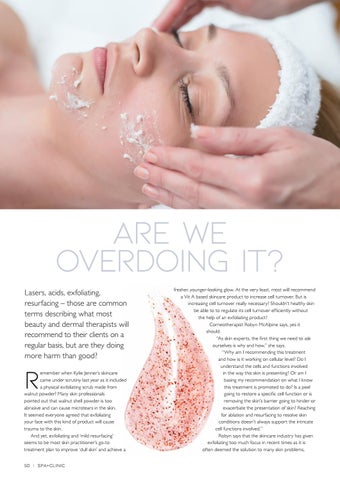Are We Overdoing It? Lasers, acids, exfoliating, resurfacing – those are common terms describing what most beauty and dermal therapists will recommend to their clients on a regular basis, but are they doing more harm than good?
R
emember when Kylie Jenner’s skincare came under scrutiny last year as it included a physical exfoliating scrub made from walnut powder? Many skin professionals pointed out that walnut shell powder is too abrasive and can cause microtears in the skin. It seemed everyone agreed that exfoliating your face with this kind of product will cause trauma to the skin. And yet, exfoliating and ‘mild resurfacing’ seems to be most skin practitioner’s go-to treatment plan to improve ‘dull skin’ and achieve a 50 | SPA+CLINIC
fresher, younger-looking glow. At the very least, most will recommend a Vit A based skincare product to increase cell turnover. But is increasing cell turnover really necessary? Shouldn’t healthy skin be able to to regulate its cell turnover efficiently without the help of an exfoliating product? Corneotherapist Robyn McAlpine says, yes it should. “As skin experts, the first thing we need to ask ourselves is why and how,” she says. “Why am I recommending this treatment and how is it working on cellular level? Do I understand the cells and functions involved in the way this skin is presenting? Or am I basing my recommendation on what I know this treatment is promoted to do? Is a peel going to restore a specific cell function or is removing the skin's barrier going to hinder or exacerbate the presentation of skin? Reaching for ablation and resurfacing to resolve skin conditions doesn’t always support the intricate cell functions involved.” Robyn says that the skincare industry has given exfoliating too much focus in recent times as it is often deemed the solution to many skin problems,
